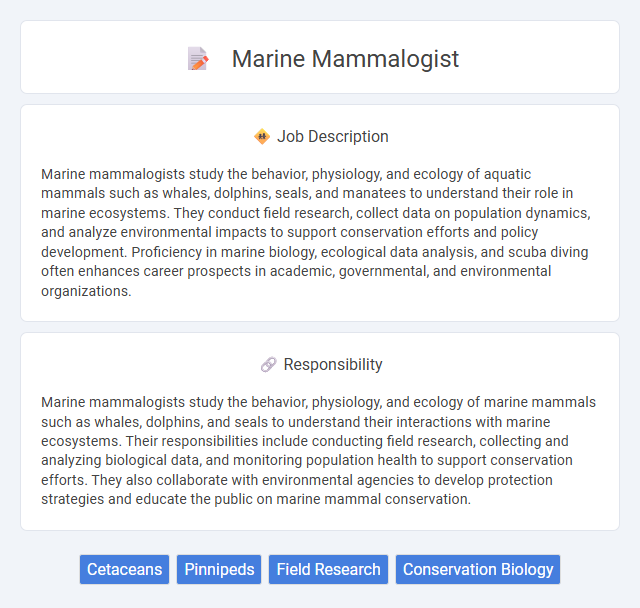
Marine mammalogists study the behavior, physiology, and ecology of aquatic mammals such as whales, dolphins, seals, and manatees to understand their role in marine ecosystems. They conduct field research, collect data on population dynamics, and analyze environmental impacts to support conservation efforts and policy development. Proficiency in marine biology, ecological data analysis, and scuba diving often enhances career prospects in academic, governmental, and environmental organizations.
Marine mammalogist roles might be best suited for individuals with a strong passion for marine biology and a resilient, adventurous spirit. People who are comfortable with unpredictable outdoor environments and possess patience for long-term research may find this career fulfilling. Those who prefer stable, indoor work settings could experience challenges adapting to the dynamic conditions typical in marine mammalogy.
Qualification
Marine mammalogists typically require a minimum of a bachelor's degree in marine biology, zoology, or a related field, with many positions favoring candidates holding advanced degrees such as a master's or Ph.D. Specialized training in animal behavior, ecology, and conservation, along with experience in field research and data analysis, are critical qualifications. Proficiency with diving certification and strong skills in scientific writing and statistical software is often necessary for success in this role.
Responsibility
Marine mammalogists study the behavior, physiology, and ecology of marine mammals such as whales, dolphins, and seals to understand their interactions with marine ecosystems. Their responsibilities include conducting field research, collecting and analyzing biological data, and monitoring population health to support conservation efforts. They also collaborate with environmental agencies to develop protection strategies and educate the public on marine mammal conservation.
Benefit
A marine mammalogist is likely to benefit from extensive opportunities for hands-on research with diverse marine species, which enhances both practical knowledge and career prospects. The profession may offer a strong sense of purpose through contributing to marine conservation and biodiversity understanding. There is a probability of job satisfaction due to collaboration with scientific communities and engagement in fieldwork in unique aquatic environments.
Challenge
A career as a marine mammalogist probably involves navigating complex challenges such as studying elusive marine species in their natural habitats, often under harsh environmental conditions. Conducting research may require adaptive problem-solving skills to overcome logistical and technical difficulties while ensuring minimal disturbance to marine life. Balancing scientific inquiry with conservation priorities likely demands persistent dedication and resilience.
Career Advancement
Marine mammalogists specializing in marine mammal behavior, ecology, and conservation often advance by gaining field experience and publishing research in scientific journals. Opportunities for career growth include securing roles in government agencies, research institutions, or nonprofit organizations focused on marine wildlife protection. Pursuing advanced degrees such as a Master's or PhD can significantly enhance prospects for leadership positions and specialized research projects.
Key Terms
Cetaceans
Marine mammalogists specializing in cetaceans study the behavior, biology, and ecology of whales, dolphins, and porpoises through field research and acoustic monitoring. They analyze population dynamics, migration patterns, and communication systems to inform conservation strategies aimed at protecting these marine species. Expertise in marine ecosystems, data collection, and species identification is critical for assessing human impacts like pollution and ship traffic on cetacean populations.
Pinnipeds
Marine mammalogists specializing in pinnipeds study the biology, behavior, and ecology of seals, sea lions, and walruses. They conduct field research on pinniped populations, monitor their health and habitat use, and analyze the impact of environmental changes and human activities on these marine mammals. Expertise in underwater observation techniques, data analysis, and conservation strategies is essential for protecting pinniped species and their ecosystems.
Field Research
Marine mammalogists specializing in field research conduct extensive observations and data collection on marine mammal behavior, population dynamics, and habitat use in their natural environments. They employ tools such as acoustic monitoring, tagging, and underwater surveys to gather critical information for conservation efforts and ecological studies. Expertise in data analysis and species identification enhances their ability to contribute to marine ecosystem management and policy development.
Conservation Biology
Marine mammalogists specializing in conservation biology study the behavior, genetics, and population dynamics of marine mammals such as whales, dolphins, and seals to develop effective protection strategies. They conduct field research, monitor endangered species, and analyze the impact of human activities like fishing, pollution, and climate change on marine ecosystems. Their work supports policy-making and habitat restoration efforts aimed at preserving biodiversity and ensuring sustainable marine environments.
 kuljobs.com
kuljobs.com